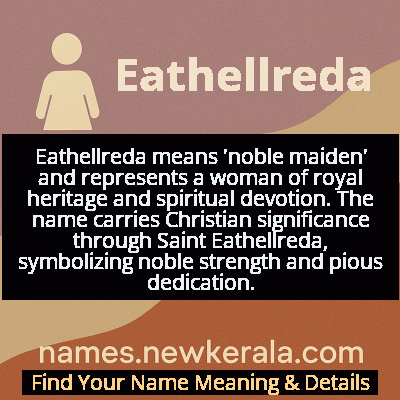Eathellreda Name Meaning & Details
Origin, Popularity, Numerology Analysis & Name Meaning of Eathellreda
Discover the origin, meaning, and cultural significance of the name EATHELLREDA. Delve into its historical roots and explore the lasting impact it has had on communities and traditions.
Name
Eathellreda
Gender
Female
Origin
Christian
Lucky Number
1
Meaning of the Name - Eathellreda
Eathellreda means 'noble maiden' and represents a woman of royal heritage and spiritual devotion. The name carries Christian significance through Saint Eathellreda, symbolizing noble strength and pious dedication.
Eathellreda - Complete Numerology Analysis
Your Numerology Number
Based on Pythagorean Numerology System
Ruling Planet
Sun
Positive Nature
Leaders, ambitious, highly driven, self-reliant, innovative.
Negative Traits
Overly aggressive, domineering, impatient, selfish.
Lucky Colours
Red, orange, gold.
Lucky Days
Sunday.
Lucky Stones
Ruby, garnet.
Harmony Numbers
2, 3, 9.
Best Suited Professions
Entrepreneurs, managers, engineers.
What People Like About You
Courage, determination, leadership.
Famous People Named Eathellreda
Saint Eathellreda of Ely
Anglo-Saxon saint and queen
Founded Ely Abbey and became patron saint of throat ailments
Eathellreda of Northumbria
Anglo-Saxon princess
Instrumental in spreading Christianity throughout Northumbria
Lady Eathellreda Fitzwilliam
Medieval noblewoman
Established several charitable foundations and monastic houses
Eathellreda Montgomery
Religious educator
Founded schools for underprivileged children across England
Name Variations & International Equivalents
Click on blue names to explore their detailed meanings. Gray names with will be available soon.
Cultural & Historical Significance
The name's evolution into 'Audrey' through linguistic simplification demonstrates how medieval saints' cults influenced naming traditions across centuries. Her feast day on June 23rd was widely celebrated in medieval England, and the famous St. Audrey's Fair gave rise to the word 'tawdry,' originally referring to lace necklaces sold there in her honor. The name continues to represent a connection to England's early Christian heritage and the powerful women who shaped it, serving as a bridge between Anglo-Saxon England and modern Christian traditions.
Extended Personality Analysis
Women named Eathellreda are typically perceived as possessing a rare combination of noble dignity and spiritual depth. They often exhibit strong moral convictions, unwavering principles, and a natural leadership quality that commands respect without being authoritarian. Their inherent nobility manifests not as arrogance but as a quiet confidence and grace under pressure. These individuals tend to be deeply introspective, valuing personal integrity above social approval, and often demonstrate remarkable resilience in facing life's challenges.
They possess an inner strength that allows them to maintain their composure and dignity even in difficult circumstances, making them natural pillars of support for others. Their spiritual or philosophical depth gives them a perspective that transcends immediate concerns, allowing them to see the bigger picture and make decisions based on long-term values rather than short-term gains. While they may appear reserved initially, those who earn their trust discover a loyal, compassionate friend with profound wisdom and empathy. The name suggests someone who balances traditional values with independent thinking, creating a personality that is both grounded and visionary.
Modern Usage & Popularity
In contemporary times, Eathellreda is an exceptionally rare name, primarily used by families with strong connections to English heritage or Catholic tradition. The name sees occasional revival among parents seeking distinctive historical names with deep Christian roots, particularly in the UK and among Anglican communities. Its more common derivative 'Audrey' remains popular, while the original Eathellreda appeals to those interested in medieval history and saint names. The name's complexity and old-fashioned nature limit its widespread adoption, but it enjoys niche popularity among historians, traditionalists, and those naming children after the saint. Modern usage typically occurs in religious contexts or among families with specific ancestral ties to the name, making it a distinctive choice that signals both faith heritage and appreciation for English history.
Symbolic & Spiritual Meanings
Eathellreda symbolizes the harmonious balance between worldly nobility and spiritual devotion. The name represents the idea that true nobility comes not from birthright alone but from moral character and spiritual commitment. It embodies the concept of 'noble strength' - the inner fortitude that enables one to maintain integrity and purpose despite external pressures. Symbolically, it connects to themes of transformation and dedication, as exemplified by Saint Eathellreda's transition from queen to abbess. The name also carries connotations of protection and healing, given the saint's association with throat ailments and her role as a protector of the faithful. In a broader sense, it represents the enduring power of faith to transform social positions into spiritual opportunities, making it a symbol of how traditional roles can be reimagined through devotion and principle.

